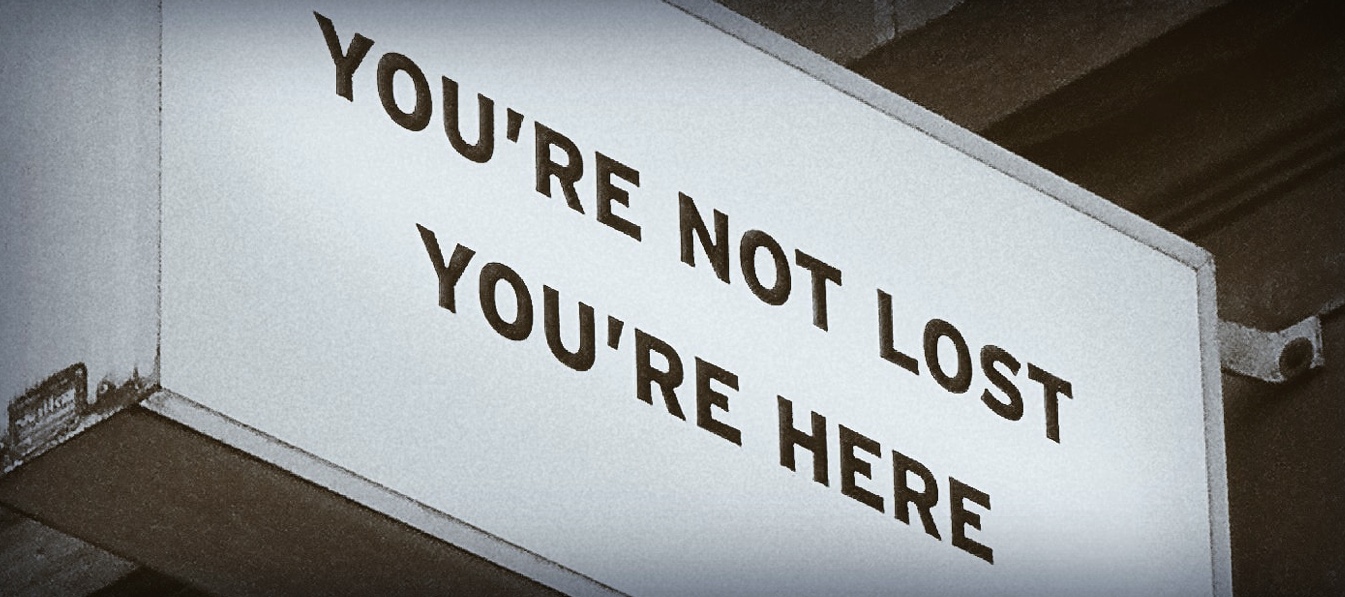Journey Challenge - ACCEPT THE NECESSITY OF DISORIENTATION

ACCEPT THE NECESSITY OF DISORIENTATION
Feeling like our future is unraveling, or at times our very selves are coming undone, is a very unnerving and unsettling experience.
However, there are times when the ‘undoing’ of our lives is necessary, and even important. Sometimes, it puts in a position to orient in a whole new way, one that can be beneficial to our lives, once we get past the undoing of the old way.
Learning to wait and being able to endure the unknown is a necessary skill to be learned as human beings. The unknown often only makes itself known gradually.
HERE’S THE CHALLENGE
Every now and again, and at certain particular times in our lives, we will find ourselves entering the dark forest of the psyche – the deep unknown – going down into the soul’s unknowable depths, and perhaps wandering ever further from ‘the path already made’.
Allowing ourselves to be disoriented, to move beyond the familiar frames of reference, going out beyond the typical dualities of life – good/bad, right/wrong – this is a very counterintuitive posture, one that can be quite perplexing to the ego. Entering the unknown goes against our initial impulses and our survival instincts, and instead it teaches us the importance of restraint.
We learn how to wait in the unknown, and to not follow that first reactive position that enters our minds, and in fact, many times we will need to do the exactly the opposite – is what ends up taking us further and deeper than our original response could have taken us.
The deep unknown is indeed a perplexing and complex inner territory, where the familiar rules on the surface of life no longer apply. Sometimes we will find this territory to be profoundly liberating and freeing, but at other times it will seem deeply unnerving and even quite threatening.
But we eventually learn not to fear the darkness so much. The darkness is something that simply reflects back the unknown in us.
HERE’S YOUR TOOLS
1. Embodiment – Practice Your Grounding Skills.
We can learn to practice resting into that space of not knowing, and ride it all the way through into the new opening or the unforeseen possibility, when it comes, in its own way on its own times.
Silent Friend of Many Distances
Lost
Grounding Meditation For Deeper Awareness

Inspiration
A Poem by Rumi
ZERO CIRCLE
Be helpless, dumbfounded,
Unable to say yes or no,
Then a stretcher will come from grace
to gather us up.
We are too dull-eyed to see that beauty.
If we say we can, we’re lying.
If we say No, we don’t see it,
That No will behead us
And shut tight our window onto spirit.
So let us rather not be sure of anything,
Beside ourselves, and only that, so
Miraculous beings come running to help.
Crazed, lying in a zero circle, mute,
We shall be saying finally,
With tremendous eloquence, lead us.
When we have totally surrendered to that beauty,
We shall become a mighty kindness.

Reflection
A short essay by Michael Mervosh
Disorientation – Coming Undone To Find a Deeper Orientation
Being temporarily disoriented, feeling lost, becoming undone – all this is a natural part of the change process – one that is not linear, but cyclical, like the seasons. If we stay with the lostness, we find ourselves in a new way, and we will have even more of ourselves than we had before.
But there is no guarantee that we make it through the disorientation, and that is the necessary risk, the price to paid, for an authentic journey, one that is capable of revealing to us new life.

Action
Practice Purposeful Wandering
Wandering From The Path Already Made – An Essay by Michael Mervosh
It is essential that we find a positive, open-minded orientation towards becoming or being lost, so that we don’t immediately succumb to the existential panic that can take over whenever we realize that we have no idea where we are, where we are going, or what we are doing – in any given moment.
At some point, it is good to practice being lost on purpose. We do this by ‘wandering’.
WANDERING PRACTICE
1. Set aside a pre-determined amount of time to step out of your usual daily routine, activity or place. Find an hour, a morning, an entire day – where you purposefully take leave of your familiar surroundings.
2. Choose a place or environment that you do not know well, that holds your curiosity or interest.
3. Have no agenda or pre-set plan. Simply roam about, exploring whatever strikes you or takes hold of your attention. See where it leads you.
4. As you head back home, or back to your routines, notice what you learned, what struck you as worthwhile.
